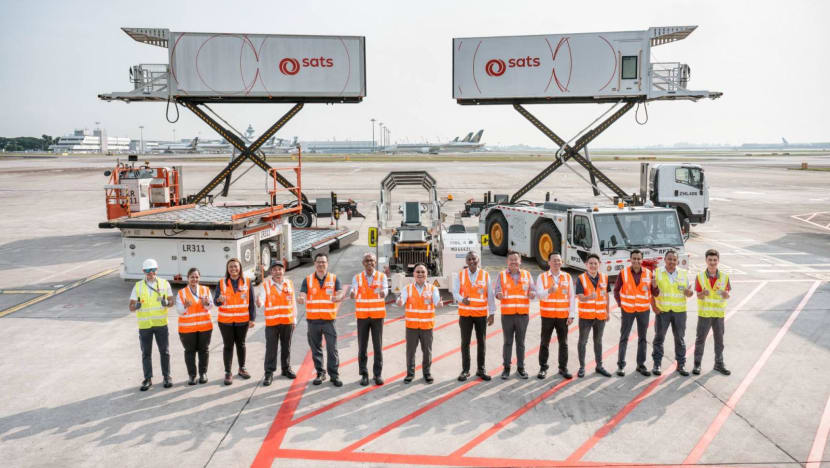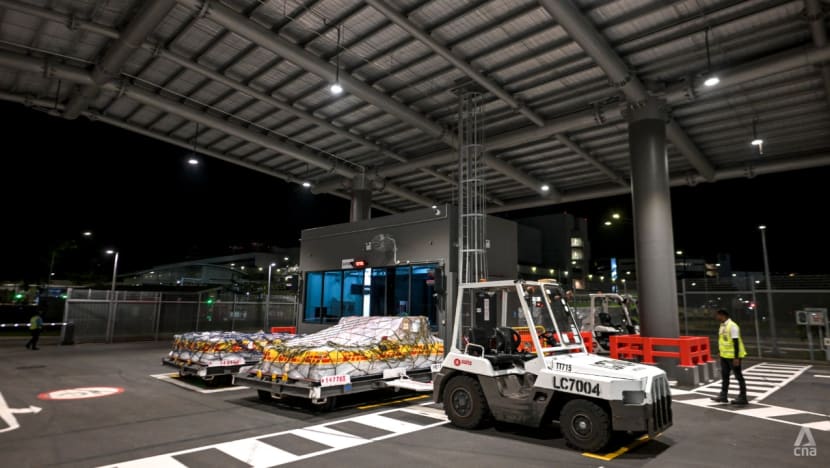Air cargo handler SATS turns to AI, simulators to prepare workforce for changing aviation sector
A new learning centre is also in the pipeline, aimed at modernising SATS’ training approach.


This audio is generated by an AI tool.
SINGAPORE: From artificial intelligence to immersive simulators, Singapore’s air cargo giant SATS is reinventing how it prepares its workers for the next generation of aviation.
It is working with universities and polytechnics to create advanced training tools that can replicate real-world airport operations, including uncommon situations that ground staff may not face daily.
A new learning centre is also in the pipeline, aimed at modernising SATS’ training approach. It will revamp how instructors deliver lessons and integrate technologies such as augmented and virtual reality to better engage employees.
"The workforce of today and tomorrow learns in a very different way compared to the workforce of the past, and this is something that we are looking to transform,” SATS Singapore Hub CEO Henry Low said during an interview with Â鶹.
These efforts are part of SATS’ broader push to future-proof its workforce.
EMPOWERING THE WORKFORCE
“We believe in making jobs fulfilling, in having our workforce be appreciated, and that the jobs be meaningful. So this is what guides us when we are engaging in how we design our jobs,” said Mr Low.
“A worker of the future is no longer one that needs to be honed by decades of experience and apprenticeship, but somebody who will be able to tap all the technologies … to make sense of what is a very dynamic and agile environment.”
These initiatives come ahead of the opening of Terminal 5 (T5) in the mid-2030s – a mega terminal expected to redefine airport operations with smarter and more automated systems.
Mr Low described it as “a very large milestone” in Singapore’s journey as a premier global aviation hub.
“Terminal 5 represents an opportunity for us to totally rethink and reimagine what ground handling can be.”
To prepare for that future, SATS has launched its Hub Handler of the Future programme, which aims to transform ground handling into a safer, smarter and more connected operation.
Work is already underway.
In August, SATS opened a new cargo handling facility featuring a drive-through concept that can cut air cargo processing times by up to 20 per cent. The centre also serves as a testbed for future cargo operations at T5.
Digitalisation is also streamlining traditionally manual processes, paving the way for more efficient and adaptive workflows.
“The approach we're taking very much is how we lean on digitalisation and automation in order for us to be able to do more with the same,” said Mr Low.
“We want to be able to handle more and more volumes without making our workers work harder, but really working smarter.”

NAVIGATING JOB TRANSFORMATION
But the rapid adoption of technology also raises questions about the future of work.
An aviation jobs transformation report released in July warned that up to 30 per cent of the 60,000 jobs in the aviation industry could be redesigned over the next five years because of factors such as AI.
To support its change management efforts, SATS has involved employees early in redefining what work looks like across the company.
Over the past year, it has successfully redesigned 11 roles from cargo coordination to customer service, said Mr Low. The firm is also looking at redesigning engineering jobs as it works with new equipment such as autonomous vehicles.
During the interview, Mr Low also highlighted the need for the sector to stay agile and dynamic.
“I think Singapore, as a hub, we are very much affected by things that happen outside of our immediate geographical boundaries,” he noted.
Mr Low stressed the importance of building a workforce and operations that can anticipate global shifts, adapt quickly to changing conditions, and continue delivering seamless outcomes for both cargo and passenger customers.
“All that is happening around the world has implications on how we conduct operations and business here in Singapore and aviation,” he added.














